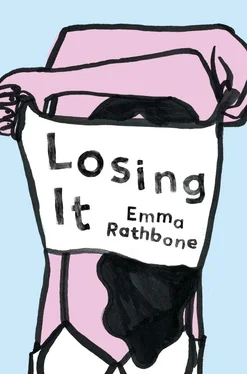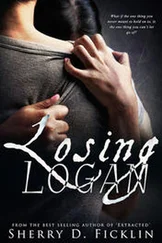“You are?”
“Yeah.”
“Do you think that’s a good idea?”
“Well, why not?”
“Maybe she likes things the way they are.”
“No,” I said, “I don’t think so.”
I had to know it could happen for Aunt Viv. That the tide of bad luck, or whatever it was, could be reversed. I didn’t want to do the background mental shifts to accommodate the kind of world where she’d be alone forever. If you looked at it from the outside, it made total sense — a man and a woman meeting in their late fifties and falling in love. And, on the board game of their lives, there had to be some pike or fork that diverted them into each other’s path. And maybe that was supposed to be me. I had to know the pattern could be broken. The summer was more than halfway over. I felt the dark sides of my predicament pressing in on me.
An exhausted dog with its tongue hanging out walked by.
Allison tilted her head into the sun and closed her eyes. “Mmmm,” she said, “it’s such a nice day,” as if the whole world nourished her.
I stared at the long nose and noble face of the watercolor teacher. She had completely white hair, swept back, and was wearing a loose-fitting flannel shirt. She looked like the kind of plain-Jane woman who still managed to elicit gritty loyalty in the men she was with. Not exactly pretty, but elegant in the way she did things. She probably had a quiet, studious way that a man would eventually fall in love with without really knowing why. She looked like she had had a lot of unself-conscious sex, like her life was racked by sex and she never even talked about it because it was such a given. I could see her being bent over things, bending, bending, bending, over a wooden horse, a sofa, laughing, her life replete, sun-soaked. She probably knew how to change a tire, and had a laugh like ribbons crumpling to the ground. I could just see her life. I could just see it.
Everyone was looking at me.
“My name is Julia,” I said. “And I’m here because I wanted to try something new. I did some watercoloring once, when I was a kid, but I’ve forgotten how to do it since then.”
“I’m Sandy,” said the woman next to me. “I’ve had some experience, but I wanted to learn more about the technique.”
“I’m Aames,” said the guy next to her. “I’m here for a friend.” Everyone laughed. He had long gray hair fanned out over a tattered jean jacket, and he looked around at everyone with a rigid, defiant expression as if challenging us to not think he was charming.
It was the day of my first watercolor class and it had rained. When I got to the college campus, all the redbrick pathways were misting and people were just starting to emerge from under awnings, shaking out their umbrellas. I parked and walked in what I thought was the right direction.
The campus, sleepy during the summer, was composed of colonial-style buildings and pleasantly unkempt trees. The building I walked toward, however, seemed to be some kind of cubist, concrete, 1970s add-on. I passed two metal benches outside the entrance and a sculpture of suspended silver zigzags.
I took the elevator up to a big airy room on the third floor. It was nice enough with the windows open, looking out onto all the wet, jungly greenery outside. The smell of rain came in. Someone had shoved a bunch of chairs and some burlap couches to one end, and people were standing around, waiting for the teacher, some leaning against the windowsills.
Upon entering, I immediately scanned the room for possibilities. There was a mom-type with a sullen sixteen-year-old daughter. There were a few women in business clothes chatting and eating pasta out of Tupperware and wearing plastic badges as if they’d just come from their jobs as health administrators; a cheerful lady, wearing linen overalls, who I just knew was going to be pleasant to talk to; then there was the guy named Aames, with his hair fanned over his back.
The teacher strode in wearing riding boots. Behind her was Gerald.
Gerald Campbell. There was just something so open about him. That was the first thing I noticed. He had the tentative, fragile smile of a kid who got routinely bullied and was constantly trying to make amends.
He seemed more or less my age, maybe a little older. He had a fleshy, square-shaped face. He was wearing the ill-fitting jeans of a homeschooler, or someone who had been too protected to develop a sense of cultural agility, and a thick, striped sweater. He had darting eyes and that delicate smile, and then there was a detail that would, in any other circumstance, have caused me to completely discount him — a neon-green lucky rabbit’s foot hanging from his belt loop.
None of this would usually have added up to anything resembling the type of guy I would have wanted to be in any type of heavy-breathing situation with, but ever since the conversation with my mom I’d felt a dark, locked-down sense of purpose. I watched him lean his watercolor pad against the wall, look hopefully around, and apologize to no one in particular when his keys fell to the floor. It was the time for action, and here was a nice, eager, sweet-looking guy. Not exactly the man of my dreams, but someone who would work for a once-off, an anonymous encounter.
I was further emboldened when he introduced himself. “I’m Gerald,” he said. “I just moved to town, and I thought I’d just get out there and try something new.” His voice was really low and a little gravelly, which dispelled his slightly uncooked exterior a little.
I attempted to set my easel — an unwieldy wooden thing I’d had to lug from a corner of the room — next to his, in a way that I hoped didn’t seem too obvious, although I had a feeling that the sixteen-year-old girl, who was shooting looks my way, knew exactly what I was doing the whole time.
We all hauled out paints and palettes and brushes from a supply closet and set everything up. Our teacher began the class with a demonstration in which she created flower petals with simple dabs of the brush.
“I like your rabbit’s foot,” I said to him, once we got started. In the tumult of getting ready, the class had proven to be a jovial one, with everyone sort of cheerily apologizing for getting in each other’s way, and talking and complimenting one another on their progress. There was enough chatter going on, with the teacher walking slowly around the circle to offer tips, that starting a conversation with the person next to me did not seem to ripple anything in a strange way.
“Ah, thank you, thank you,” he said, looking down at it. “My brother gave it to me. He said it was good luck, and so I started wearing it, and now I’m afraid to take it off.”
“I understand,” I said, which was true. This was just the kind of superstitious nonsense I could relate to.
Next he offered something: “Have you seen her work?” he said, indicating our teacher. I could tell he didn’t think we were flirting yet.
“No,” I said. “You mean, is she like locally famous or something?”
“I looked her up. She won the North Carolina stamp design competition.”
“No kidding.” I watched the teacher; she was leaning over the girl, pointing at something on her canvas. “I didn’t know any old person off the street could design a stamp.”
“Well, what with budget cuts and everything,” he said. His eyes cut to me.
I laughed. “What would you design? If you had to make a stamp.”
“Hmmm.” He seemed to take the question very seriously. “Maybe a bird, the state bird. What about you?”
“For North Carolina? Maybe like an old… barn.”
He smiled. “I like it.”
“You’re really off-roading there,” I said about ten minutes later, pointing at his pad, on which he’d painted a lizard walking up the side of the page, with squiggles around it to indicate its zany passage.
Читать дальше
Конец ознакомительного отрывка
Купить книгу












